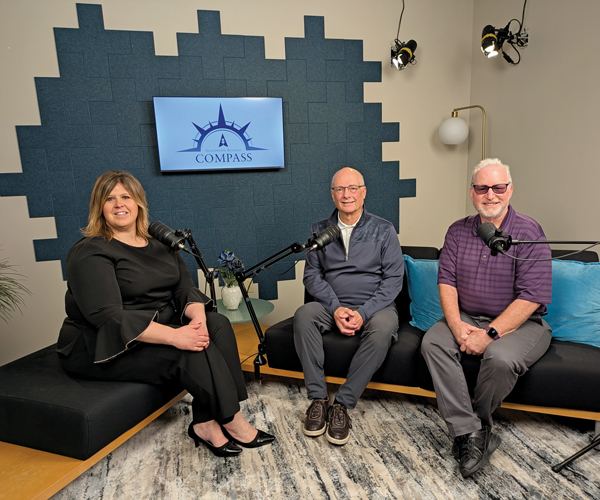As Joe Roman steps down as president and CEO of Greater Cleveland Partnership (GCP), he leaves behind a legacy of leadership that has reshaped the local and regional economy. But are his shoes too big to fill?
Roman has served in that role since its inception in March 2004. Prior to that, he served as executive director of Cleveland Tomorrow, an organization that was merged into GCP when it was created. In its time, Cleveland Tomorrow was also recognized by Harvard Business School as one of the most innovative and successful regional business organizations in the country. Today, GCP is the largest metropolitan chamber of commerce in the country, with more than 12,000 members. Joe Roman was certainly the guiding force in making that happen.
“As leader of GCP and Cleveland Tomorrow, Joe helped realize some of Cleveland’s most important projects, including Gateway, the Rock Hall, the Convention Center and many more,” says Scott Chaikin, executive chairman of Dix & Eaton and immediate past board chair of GCP. “He also helped strengthen critical institutions like NASA Glenn, Hopkins and Cleveland Metropolitan School District.
“But his greatest accomplishment was engaging people in Cleveland’s progress by encouraging and uniting the will, resources and involvement of local business leaders to move our entire community forward.”
Armond Budish, county executive of Cuyahoga County, also praises Roman’s ability to motivate CEOs, as well as his tremendous impact on local economic development.
“When I became speaker of the Ohio House back in 2009, I wanted to create an economic development plan for the state that would also be a benefit to Northeast Ohio, my home area,” says Budish. “So I met with Joe and a number of other leaders, and they helped me develop a plan where the central piece was to renew and expand the Third Frontier Project, which included a significant bond issue that invests in research and development, among other projects. It was key to our successful economic development and has been a tremendous boost for Northeast Ohio.”
Dorothy Baunach, chief executive of DigitalC, worked with Roman on the Third Frontier Ballot Initiative, which works with innovative startups across the state to make Ohio a destination for technology entrepreneurs.
“So I went down to Columbus with Joe’s support, and we were able to pass it,” says Baunach. “It brought about a huge transformation in entrepreneurship, venture capital, tech space and economic development.”
The Third Frontier Ballot Initiative also was a great example of Roman’s leadership qualities. However, he was a leader who preferred to be behind the scenes.
“Joe worked for the CEOs,” says Baunach. “He always knew who he worked for, and he always thought of himself as staff — even though he was a great leader in his own right. When CEOs decided to take something on, which was typically a part of a public/private partnership, Joe knew how to execute on it.”
That was just a part of Roman’s leadership style, says Baunach.
“Joe was never about himself. He wasn’t seeking a platform for himself — and he was never seeking headlines. He only wanted to do what was right — he was always thoughtful,” Baunach recalls. “When a project would come up, he would always say, ‘We got to get as smart as possible on this before we decide how to address it.’ He was always data driven.”
Another important aspect of Roman’s success was not only his ability to lead, but not being afraid to surround himself with talented people, Baunach adds.
“He hired and retained good people and was always loyal and kind to his people,” adds Baunach. “He trusted his team to make the right decisions.
“And I never saw Joe Roman get angry. He is an even-keeled person with a great sense of humor, always thinking creatively — whether you agree with him or not. There were times when you might scratch your head on how he came up with an idea, but he always listened to yours.”
“Joe has incredible knowledge and great ideas but his ability to accomplish big things is built on his interpersonal skills,” adds Chaikin. “He has a gift for understanding the value each person can bring and for helping them realize the greatest impact from their efforts.
“I think that’s true in terms of his leadership of the GCP staff and also of his interactions with GCP board members. He knows peoples’ capabilities and interests and puts together collaborations that are able to achieve amazing things.”
Dave Abbott, president of the George Gund Foundation agrees that Roman, through his efforts, personal interaction and behind-the-scene management style, was able to turn GCP into the voice of the business sector. But it wasn’t all about business and economic development.
Roman realized the importance of private/public partnerships and strong community involvement. Abbott believes that marshalling and sustaining the business community’s commitment to the transformation of Cleveland Metropolitan School District was Roman’s finest hour during his term at GCP.
“Joe’s personal interest in and commitment to education has been instrumental in keeping GCP engaged with developing and pursuing the Cleveland Plan,” Abbott says. “This hasn’t been glamorous work — far from it. But among other things, GCP has been an essential partner in getting the needed law changes through the Ohio legislature and securing voter support for the vital school levies. I doubt that it would have happened without Joe.”
Raising money for what is now called the Cleveland Development Advisors (CDA), was another key accomplishment, says Abbott.
“He was the point person on this effort when it got started at Cleveland Tomorrow, and for about 30 years it’s been an essential force in countless development projects, including scores in Cleveland’s neighborhoods,” Abbot says. “I really can’t imagine where Cleveland would be today without CDA, and Joe was there on the ground floor building it.”
Like Baunach, Abbott also admires the way Roman would work behind the scene to accomplish even the loftiest of goals.
“Although the job generates a fairly high profile, Joe has never been one to clamor for the limelight,” says Abbott. “Indeed, he’s actually more comfortable behind the scenes even though he’s quite good in the public aspects of his role.
“But the quiet assurance he brought to his work made him a more effective navigator of the complicated environment he worked in. He knew he could never make everyone happy, but he took the criticism that came with the territory in stride.”
“GCP is a strong organization with great people, and it will continue to thrive,” says Chaikin. “Joe’s body of work, though, will be very tough to match.
“He has been a leader in many of Greater Cleveland’s signature efforts, singularly focused on our community’s progress, for a quarter-century. I’m not sure you can say that about anyone else.”
Now, as Baiju Shah steps into his new role as president and CEO of the GCP, will he be able to fill Roman’s shoes?
“I’m very excited about Baiju Shah,” says Baunach, echoing the sentiment of most in the business and philanthropic community. “I don’t think anyone has to fill Joe Roman’s shoes. Joe Roman can walk off the stage in his own well-worn shoes and feel proud of what he has done.
“Baiju will enter in his own shoes and get the job done,” Baunach says.




